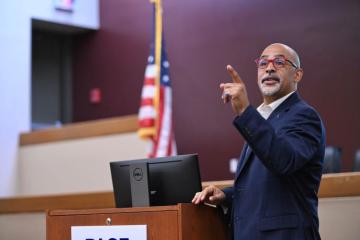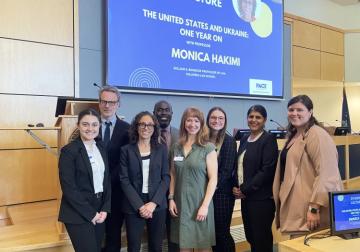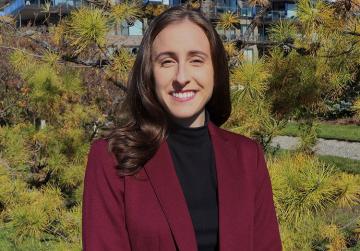Elisabeth Haub School of Law at Pace University’s Pace Law Review Holds Symposium, “Bioethics After Dobbs,” with Annual Dyson Lecture Delivered by Harvard Professor I. Glenn Cohen
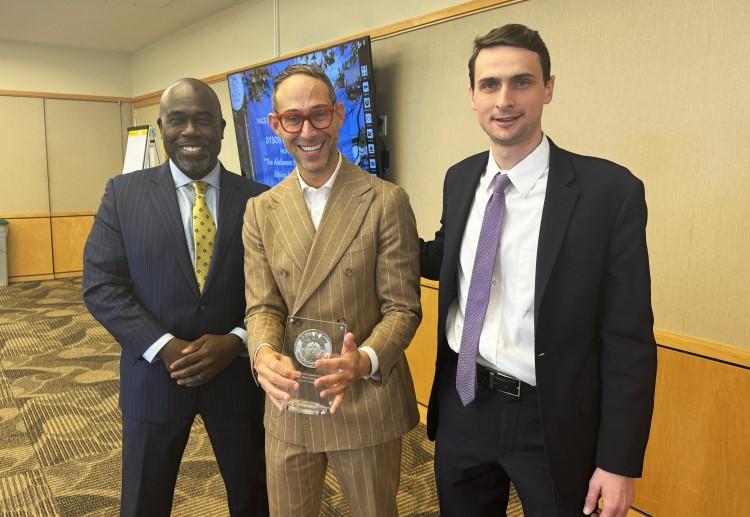
On Friday, April 5, 2024, Pace Law Review (PLR) presented its triennial Symposium and Haub Law’s annual Dyson Lecture, attracting over 100 attendees. The theme of the symposium was Bioethics After Dobbs. The Dyson Lecture, entitled The Alabama Embryo Decision in Ethics, Law and Politics, was delivered by Professor I. Glenn Cohen, the James A. Atwood & Leslie Williams Professor of Law and Deputy Dean of Harvard Law School.
The PLR Symposium was a full-day event organized by the PLR board with the support of Assistant Professor of Law James Toomey and PLR faculty advisor Professor Leslie Y. Garfield Tenzer. Opening remarks were delivered by PLR Editor-in-Chief, Madison Powers, and Managing Editor, Rianna Iorillo. Fundamental questions about the balance between individual autonomy, personhood, the relationship between practitioners and their patients, ethical considerations in research, and more were discussed through four panels. The panels brought together legal scholars, bioethicists, healthcare experts, and practitioners and each of the panels were moderated by expert professors at Haub Law.
In between the lively panel discussions, the highlight of the conference was the presentation of the Dyson Lecture by Professor I. Glenn Cohen. Haub Law Dean Horace Anderson introduced Professor Cohen, noting his numerous achievements, which includes being one of the leading experts at the intersection of bioethics and law, discussing medical AI policy with members of the Korean legislature, and contributing to legal and medical conferences around the world. Professor Cohen’s work has also been widely cited in the media, from the New York Times and the Washington Post, to PBS, NPR, and CNN. Professor Cohen has authored, co-authored, and edited over 20 books and 200 articles.
During his lecture, Professor Cohen spoke about several themes emerging from the February 16, 2024 decision of the Alabama Supreme Court in LePage v. Center for Reproductive Medicine, which held that embryos produced for IVF and held in storage qualify as “children” for purposes of Alabama’s Wrongful Death of a Minor Act. For example, he covered issues including the implications of the decision in the context of the fetal personhood movement in America, the relationship between discourse on abortion and discourse on IVF and embryo destruction, and the gap between bioethical and legal discourse on this topic, connecting these themes to bioethical questions surrounding the Supreme Court’s decision in Dobbs v. Jackson Women’s Health Organization.
Articles based on the panelists’ presentations will be published by PLR in a symposium edition. Edited and published by students, the Pace Law Review is devoted to the study and publication of scholarly materials of professional legal interest. Each issue contains articles by professors, practitioners, and judges, as well as student notes and comments, on specific issues in law, recent decisions, and current legislation. PLR publishes at least two issues per year: the Fall Issue, and the Spring Issue.
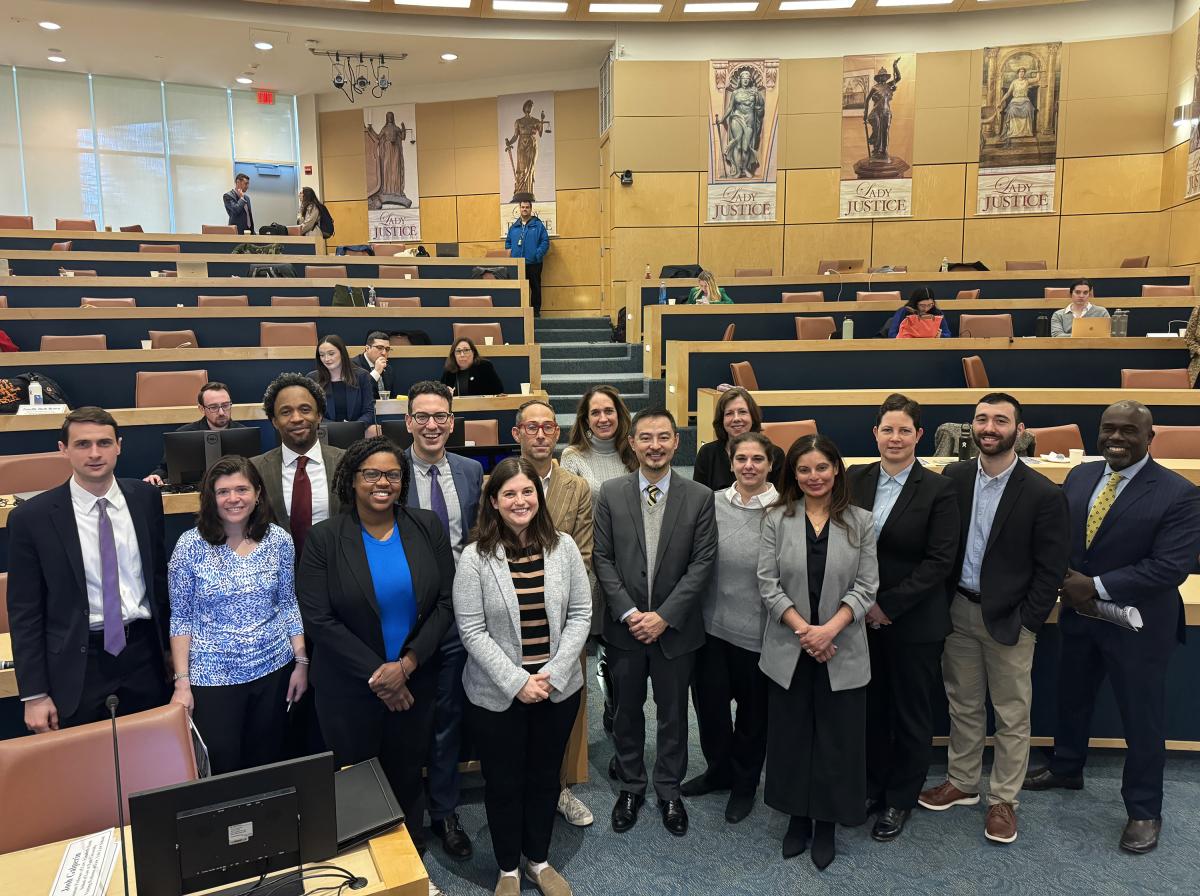
The Dyson Distinguished Lecture was endowed in 1982 by a gift from the Dyson Foundation made possible through the generosity of the late Charles H. Dyson, a 1930 graduate, trustee, and long-time benefactor of Pace University. The principal aim and object of the Dyson Distinguished Lecture is to encourage and make possible scholarly legal contributions of very high quality in furtherance of Haub Law’s educational mission.
This year’s symposium panelists and their presentations included:
- Lynette Martins, Former Senior Research Fellow, Solomon Center for Health Law and Policy, Yale Law School, & Scott Schweikart, American Medical Association, The Practitioner-Patient Relationship in the Post-Dobbs Era
- Rebecca Feinberg, Jacob D. Fuchsberg Law Center, Touro University, Crisis Pregnancy Centers After Dobbs
- Sabrina Singh, Rutgers School of Communication and Information, Ethical Considerations in Qualitative Research After Dobbs
- Rachel Rebouché, Temple University Beasley School of Law, Mailed Abortion Medication
- Dov Fox, University of San Diego School of Law, & Gerard S. Letterie, Seattle Reproductive Medicine, Forum Shopping and Personhood Law: Implications for the Disposition of Frozen Embryos
- Myrisha S. Lewis, William & Mary Law School, Assisted Reproductive Technologies in Legislation and Regulation
- Teneille Ruth Brown, University of Utah S.J. Quinney School of Law, We Have Lost Our Minds
- Megan S. Wright, Penn State Law School, Medical Decision-Making Law and Practice Post-Dobbs
- Doron Dorfman, Seton Hall Law School, Disability Law and Selective Abortion Bans After Dobbs
- Greer Donley, University of Pittsburgh School of Law, Brain Death and Abortion
- S. Matthew Liao, NYU School of Global Health, When to Save the Baby: A Fundamental Conditions Approach
- Thomas Williams, American University School of Law, Assisted Reproductive Technologies and Personhood in Legislation and Regulation

